

Share
3rd March 2022
06:43pm GMT

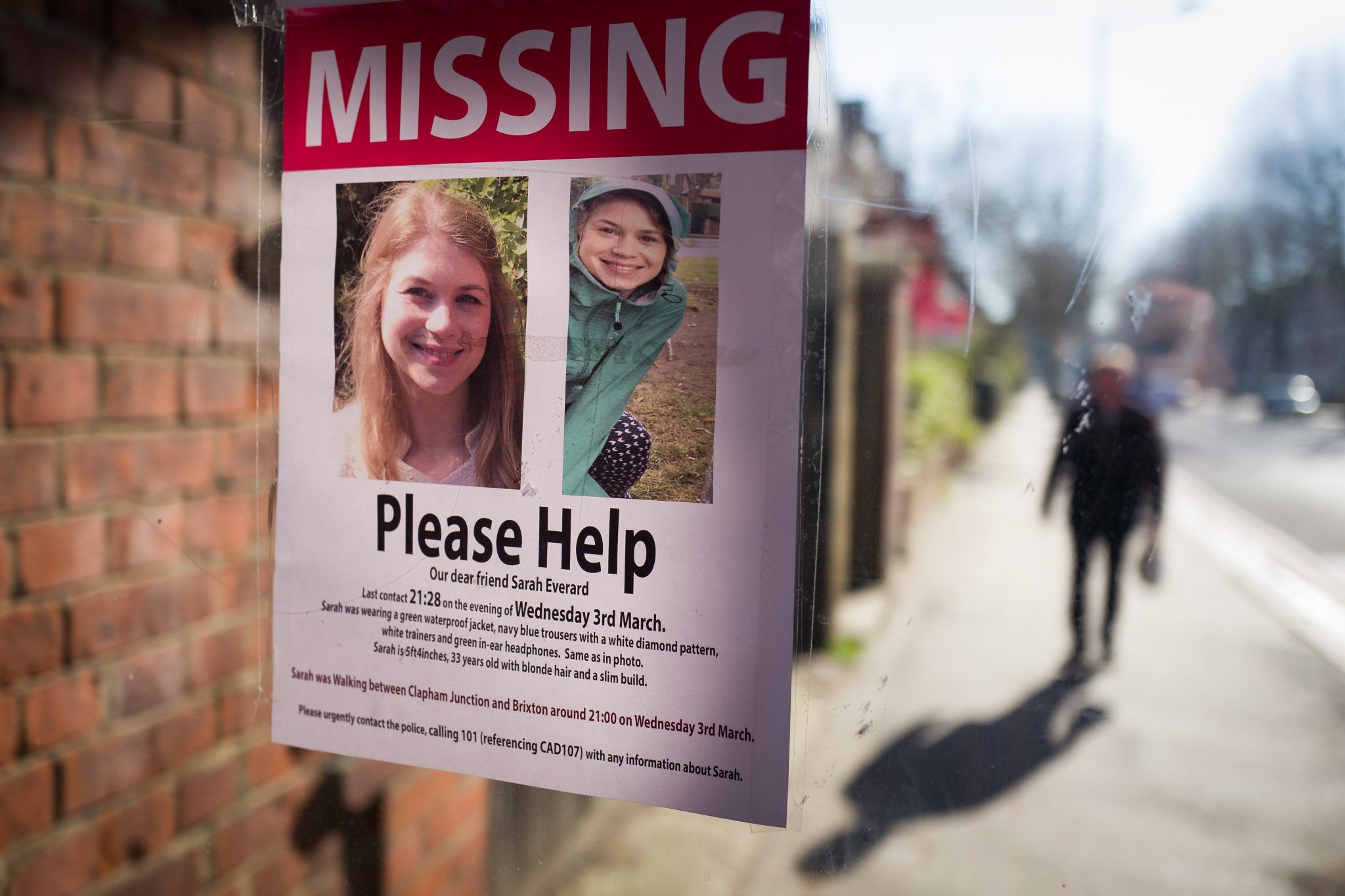 Sarah Everard went missing on March 3, 2021 (Getty)[/caption]
Match had always been "really persistent" in ushering his female friends into Ubers, not least because he'd been jumped multiple times himself.
“I’m a six-foot-seven guy and I sometimes feel a bit weird walking around,” he told JOE, “So what is it like for women walking home on their own?”
In the days, weeks, and months after Everard was kidnapped, while she walked home in Clapham, south London, women have shared horror stories about their own journeys and the desperate methods employed to do so safely. And police and politicians have pledged to do more.
London Mayor Sadiq Khan said Thursday that he will "continue to do everything within my power to ensure ending violence against women and girls is treated with the utmost urgency both by police, and society as a whole."
And earlier this week, the government announced a major communications campaign against abuse, and put tackling violence against women and girls (VAWG) on the same footing as terrorism. Police also appointed a national lead for violence against women and are piloting a more aggressive approach to suspected perpetrators of sexual crimes.
https://twitter.com/MayorofLondon/status/1499293267493588992?ref_src=twsrc%5Etfw%7Ctwcamp%5Etweetembed%7Ctwterm%5E1499293267493588992%7Ctwgr%5E%7Ctwcon%5Es1_&ref_url=https%3A%2F%2Fwww.joe.co.uk%2Fnews%2Fsarah-everards-family-pay-tribute-and-say-they-miss-her-all-the-time-one-year-after-brutal-murder-320670
Everard's murder, the Guardian reported Thursday, citing new research, sparked a nationwide reckoning and revolutionised how the British public understand male violence against women.
A survey by Rosa, a grant-making charity for 320 frontline women’s organisations, found 89 per cent thought there had been a shift in public awareness. “There has been a revolution of understanding, and the scales have fallen from people’s eyes,” the charity's executive director, Rebecca Gill, told the newspaper. “I think there has also been a recognition of how normalised fear is for women. It is a fear we live with, and that we learn very young, and we carry it with us until we are old.”
The Guardian further reported that more than 180,000 people contributed to the government’s call for evidence on its VAWG strategy in the weeks after Everard’s death.
[caption id="attachment_320964" align="alignnone" width="2048"]
Sarah Everard went missing on March 3, 2021 (Getty)[/caption]
Match had always been "really persistent" in ushering his female friends into Ubers, not least because he'd been jumped multiple times himself.
“I’m a six-foot-seven guy and I sometimes feel a bit weird walking around,” he told JOE, “So what is it like for women walking home on their own?”
In the days, weeks, and months after Everard was kidnapped, while she walked home in Clapham, south London, women have shared horror stories about their own journeys and the desperate methods employed to do so safely. And police and politicians have pledged to do more.
London Mayor Sadiq Khan said Thursday that he will "continue to do everything within my power to ensure ending violence against women and girls is treated with the utmost urgency both by police, and society as a whole."
And earlier this week, the government announced a major communications campaign against abuse, and put tackling violence against women and girls (VAWG) on the same footing as terrorism. Police also appointed a national lead for violence against women and are piloting a more aggressive approach to suspected perpetrators of sexual crimes.
https://twitter.com/MayorofLondon/status/1499293267493588992?ref_src=twsrc%5Etfw%7Ctwcamp%5Etweetembed%7Ctwterm%5E1499293267493588992%7Ctwgr%5E%7Ctwcon%5Es1_&ref_url=https%3A%2F%2Fwww.joe.co.uk%2Fnews%2Fsarah-everards-family-pay-tribute-and-say-they-miss-her-all-the-time-one-year-after-brutal-murder-320670
Everard's murder, the Guardian reported Thursday, citing new research, sparked a nationwide reckoning and revolutionised how the British public understand male violence against women.
A survey by Rosa, a grant-making charity for 320 frontline women’s organisations, found 89 per cent thought there had been a shift in public awareness. “There has been a revolution of understanding, and the scales have fallen from people’s eyes,” the charity's executive director, Rebecca Gill, told the newspaper. “I think there has also been a recognition of how normalised fear is for women. It is a fear we live with, and that we learn very young, and we carry it with us until we are old.”
The Guardian further reported that more than 180,000 people contributed to the government’s call for evidence on its VAWG strategy in the weeks after Everard’s death.
[caption id="attachment_320964" align="alignnone" width="2048"]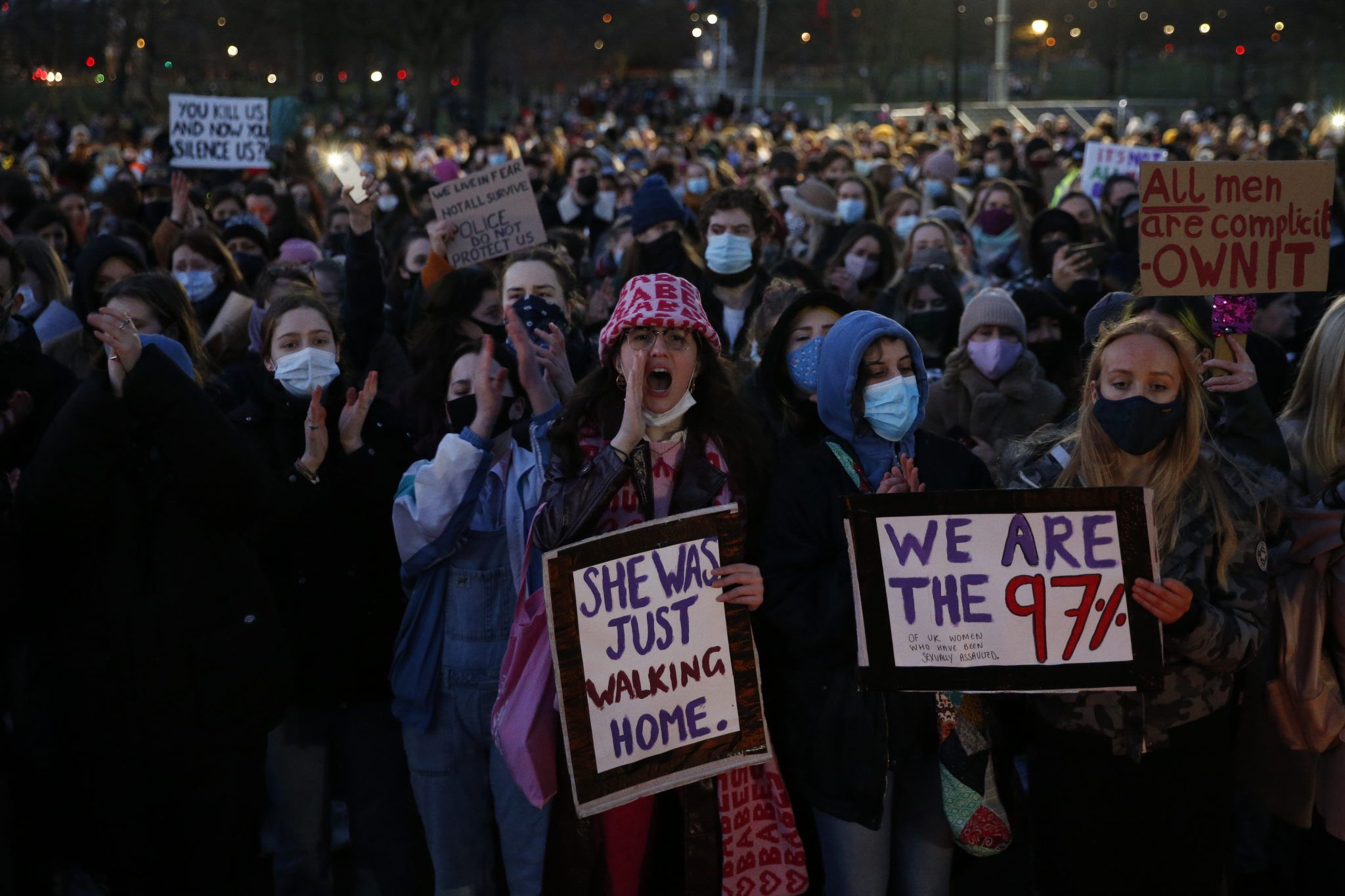 People gather to pay their respects at a vigil on Clapham Common for Sarah Everard on March 13, 2021 (Getty)[/caption]
Having followed Everard's story from missing person to murder victim, and as social media became clogged by women sharing their own accounts of unease and assault, Match felt compelled, as a man, to act.
“I realised that there was such a lack of male voice in the space talking about this. I just thought, ‘Let’s be honest, the problem is caused by men, so why are men not trying to do something to help?," he explained to JOE.
The student knew that if he raised enough money, he could help women in London who felt unsafe catch a cab home. He began by asking people to donate "the price of a pint". When it caught on, Home Safe was born.
Since then more than £6,000 has been donated and almost 1,000 rides have been refunded.
Originally, Match put out a post asking people to email their taxi receipts if they had felt unsafe and wanted to be refunded up to £10. By the time the initiative launched on December 1, claimants were required to fill out a form and provide ID to safeguard against scammers. It soon became clear that Uber trips were being favoured, so Home Safe paired with the ride-hailing app and now solely offers £10-off codes to Londoners who need it.
[caption id="attachment_320960" align="alignnone" width="1024"]
People gather to pay their respects at a vigil on Clapham Common for Sarah Everard on March 13, 2021 (Getty)[/caption]
Having followed Everard's story from missing person to murder victim, and as social media became clogged by women sharing their own accounts of unease and assault, Match felt compelled, as a man, to act.
“I realised that there was such a lack of male voice in the space talking about this. I just thought, ‘Let’s be honest, the problem is caused by men, so why are men not trying to do something to help?," he explained to JOE.
The student knew that if he raised enough money, he could help women in London who felt unsafe catch a cab home. He began by asking people to donate "the price of a pint". When it caught on, Home Safe was born.
Since then more than £6,000 has been donated and almost 1,000 rides have been refunded.
Originally, Match put out a post asking people to email their taxi receipts if they had felt unsafe and wanted to be refunded up to £10. By the time the initiative launched on December 1, claimants were required to fill out a form and provide ID to safeguard against scammers. It soon became clear that Uber trips were being favoured, so Home Safe paired with the ride-hailing app and now solely offers £10-off codes to Londoners who need it.
[caption id="attachment_320960" align="alignnone" width="1024"]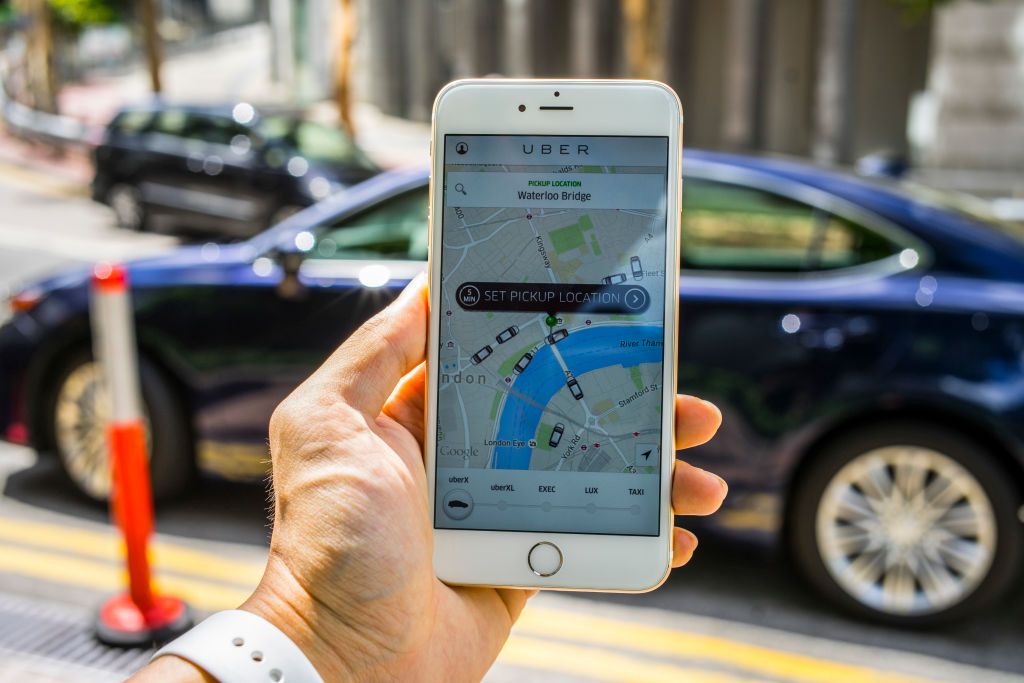 Home Safe provides Londoners with a £10-off Uber code to get home safe (Getty)[/caption]
“We’re basically trying to improve the service to make it as easy for people to use as possible,” Match said.
Match initially managed Home Safe alone, but it wasn't easy, and people waiting for refunds became impatient, with some complaining in the comments on its Instagram page.
This led to Match becoming so stressed that, he says, he ended up being hospitalised.
“I was working on Home Safe, wasn’t sleeping, and working all the time to get these refunds through. I could start feeling that I couldn’t walk properly," he explained.
Match was rushed to hospital early in December and diagnosed with Guillain-Barré - a very rare and serious condition that affects the nerves.
“I couldn’t feel my face, couldn’t walk, couldn’t really move,” he said of the ordeal, which saw him hospitalised for two weeks.
[caption id="attachment_320806" align="alignnone" width="1538"]
Home Safe provides Londoners with a £10-off Uber code to get home safe (Getty)[/caption]
“We’re basically trying to improve the service to make it as easy for people to use as possible,” Match said.
Match initially managed Home Safe alone, but it wasn't easy, and people waiting for refunds became impatient, with some complaining in the comments on its Instagram page.
This led to Match becoming so stressed that, he says, he ended up being hospitalised.
“I was working on Home Safe, wasn’t sleeping, and working all the time to get these refunds through. I could start feeling that I couldn’t walk properly," he explained.
Match was rushed to hospital early in December and diagnosed with Guillain-Barré - a very rare and serious condition that affects the nerves.
“I couldn’t feel my face, couldn’t walk, couldn’t really move,” he said of the ordeal, which saw him hospitalised for two weeks.
[caption id="attachment_320806" align="alignnone" width="1538"]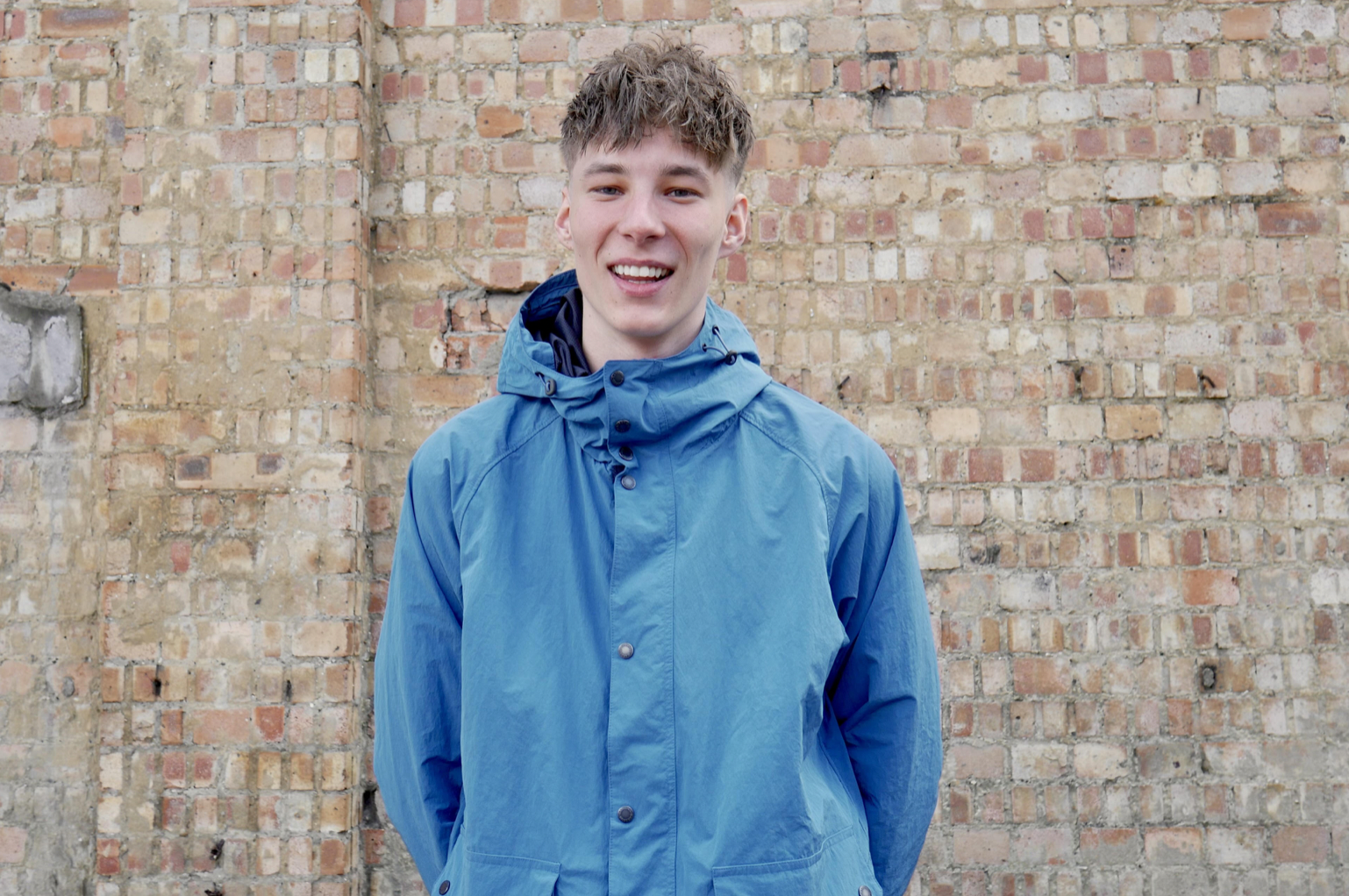 Match Sienkiewicz and his team hope to make Home Safe available across the globe[/caption]
Despite his setbacks, Match has managed to keep Home Safe going and now runs the initiative with the help of seven friends. Uber, who came on board early in December, donated £10k and is now an official partner.
Match hopes to make Home Safe available in Paris and New York by the end of the year, and then, hopefully, go global.
“We’ve sent hundreds of girls home already and we’re going to carry on doing that," he said.
“It fucking bugs me. Everything that happened [to Sarah] was absolutely horrific. But if our service was about then, maybe that couldn’t have happened. That’s what we’re trying to stop.”
[caption id="attachment_320961" align="alignnone" width="1024"]
Match Sienkiewicz and his team hope to make Home Safe available across the globe[/caption]
Despite his setbacks, Match has managed to keep Home Safe going and now runs the initiative with the help of seven friends. Uber, who came on board early in December, donated £10k and is now an official partner.
Match hopes to make Home Safe available in Paris and New York by the end of the year, and then, hopefully, go global.
“We’ve sent hundreds of girls home already and we’re going to carry on doing that," he said.
“It fucking bugs me. Everything that happened [to Sarah] was absolutely horrific. But if our service was about then, maybe that couldn’t have happened. That’s what we’re trying to stop.”
[caption id="attachment_320961" align="alignnone" width="1024"]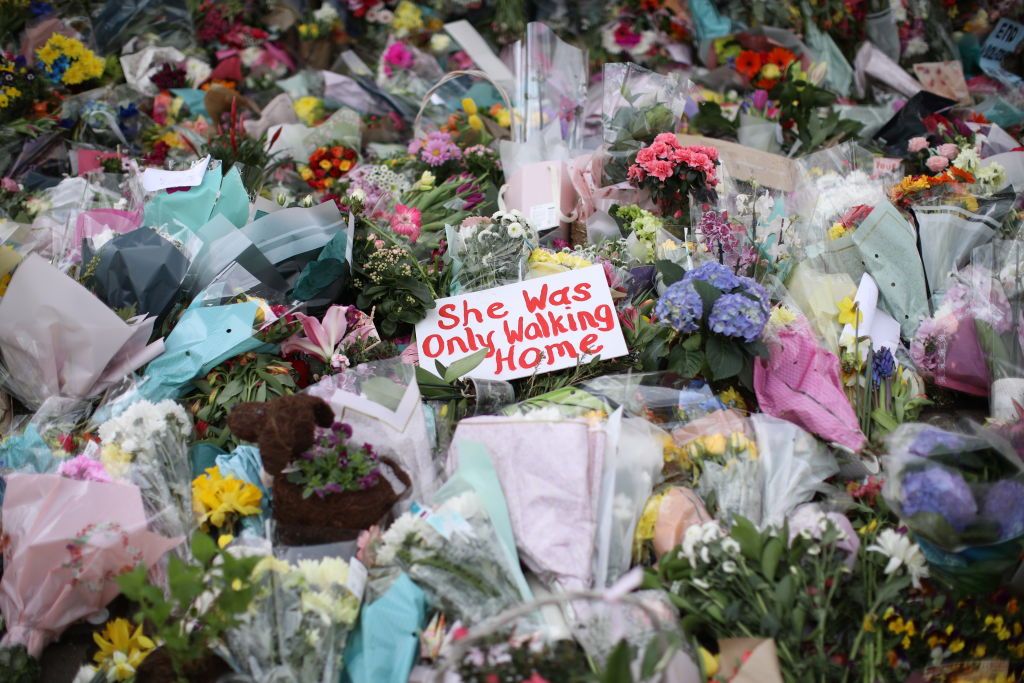 Thousands of flowers were placed in tribute to Sarah Everard on Clapham Common on March 15, 2021 (Getty)[/caption]
In 2021, at least 141 women were killed by a man, or where a man was the principal suspect.
Last month the head of the Met, Cressida Dick quit, in part, because of a report that showed just how toxic the force is. It uncovered disturbing WhatsApp messages between officers that included racist, homophobic and misogynistic language as well as “jokes” about rape and sexual violence.
For Match, Home Safe, can't solve the problem of men making women and girls feel unsafe, but "I think we’re just a step in the right direction".
Related stories:
Thousands of flowers were placed in tribute to Sarah Everard on Clapham Common on March 15, 2021 (Getty)[/caption]
In 2021, at least 141 women were killed by a man, or where a man was the principal suspect.
Last month the head of the Met, Cressida Dick quit, in part, because of a report that showed just how toxic the force is. It uncovered disturbing WhatsApp messages between officers that included racist, homophobic and misogynistic language as well as “jokes” about rape and sexual violence.
For Match, Home Safe, can't solve the problem of men making women and girls feel unsafe, but "I think we’re just a step in the right direction".
Related stories:
Explore more on these topics: